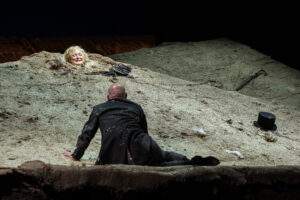The Samuel Beckett classic, as seen by Jessica Harris.
To hold an audience with a near monologue for nearly two hours is a challenge for any actor. To deliver it whilst buried waist-deep for much of the time, and neck-deep for the final act, is a feat of physical and emotional endurance. Siobhán McSweeney as Winnie (an old familiar as Sister Michael in Derry Girls) triumphs in this role.
Stuck in a mound of stony earth, the empty wasteland seemingly going on forever, Winnie muses on what she can do to pass the hours of the day. Apart from the occasional appearance by Willie, played by Howard Teale, his back mainly to the audience and uttering only the odd monosyllabic word, she is alone. At her disposal are her upper body and a few props. Yet she conveys a gamut of emotions, from memories of lost passion to endless optimism that life has purpose. The power of McSweeney’s performance is in her ability to convey parallel perspectives: Winnie’s words are empty vessels, but the slightest acknowledgement from Willie is sufficient to sustain her self-delusion: “This is going to be another happy day”.

Happy Days
McSweeney’s performance in the second act projects a bleaker outlook and is wonderfully judged. Trapped up to her neck, she is no longer able to reach her props or live up to her act one mantra, “Keep yourself nice, Winnie, that’s what I always say. Come what may, keep yourself nice”. Her black shoulder-strap dress and pearl necklace are no longer visible; her immaculate hair-do has gone. She talks of sadness and cries out for help. But yet she smiles and, persuaded there is still something in it for her and Willie, sings her song, “You love me so!”.
The production’s set and lighting are striking in design, and support the metaphorical nature of the play. The landscape is barren, the sun relentless: hope has gone. Winnie and Willie are in a slow, but inevitable, state of decline: Winnie, slowly sinking into the earth, has lost all mobility whilst Willie’s words become fewer and fewer words as time goes by.
Other metaphors are more ambiguous: the revolver which Winnie takes from her bag is never used. In the play’s final scene, Willie crawls up the bank towards her and we are left wondering if he is trying to reach her or the gun.
Becket is not for everyone. His worldview is bleak, his plays deliver character but not action, his combination of humour and tragedy is disturbing. But theatre has always been a space for risk-taking and it’s good to see the Rep, in current hard-pressed times, having the confidence to programme this production.
Happy Days was directed by Caitríona McLaughlin, set and costumes were designed by Jamie Vartan, lighting by Paul Keogan and sound by Sinéad Diskin.
It runs at the Rep until 1st July. For further information visit birmingham-rep.co.uk
Pics – Pat Redmond and Marcin Lewandowski.


